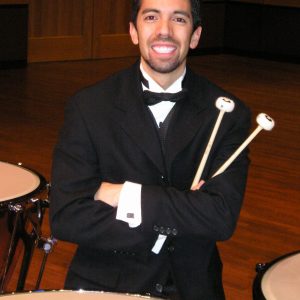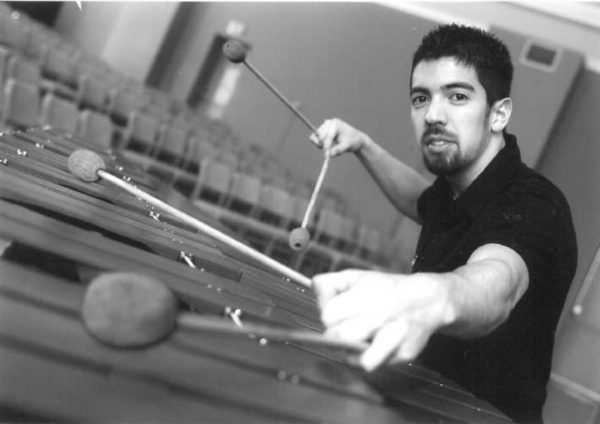
How can a music performance degree prepare you for an exciting career as a SWAT officer?
Just ask Danny Canete (B.A. Music, ’04), who took lessons learned through his degree in music performance to make a meaningful impact on his community and far beyond.
Canete was just 5 years old when he first began playing piano. When other children shied away from the stage, Canete ran toward it. He improved quickly and could be seen playing as an accompanist in church, at recitals and events, and competing in local and state-level music competitions. His passion was in the performance of music and sharing the power of music with his community.

As an out-of-state student, Canete faced significant financial barriers in his dream to earn a music degree and attend his dream program at CSU. Thanks to the support of music faculty, including Janet Landreth and Eric Hollenbeck, Canete received scholarship funding that enabled him to afford his out-of-state tuition.
“My advice for those choosing their degree is to not enroll in a major that you think is going to get you a specific job or fulfill an expectation that other people have placed on you. Enroll in what you are passionate about. You will gain skills and personal traits that will contribute to enriching your life and you as a person. And what the world needs is well-developed people who are happy,” shares Canete.
As a musician, his desire was to share music with people to perpetuate a love for the arts and to educate the public in order to keep the classical arts alive. While studying at CSU, Daniel was active in performing music in the Fort Collins scene. Besides playing in many of the notable ensembles and venues along the Front Range, Canete also competed in the Jefferson Symphony International Young Artists Concerto Competition in 2001, where he placed 2nd as a soloist on the marimba after beginning his studies on the instrument only four months prior.
He was sitting in Professor Gary Moody’s music class on September 11, 2001, when he learned of the tragic events unfolding across the country. Moved by the news and his deep belief in being a steward to his community and country, he nearly quit school to join the military. While reflecting on this big decision, he decided he couldn’t give up the phenomenal scholarship package he received and chose to finish his degree. But the desire to serve his country stuck with him and continued to shape the course of his life.
After graduating with a music performance degree in percussion, Canete went on to attend the University of North Texas for studies in a Master of Music in Percussion Performance while also teaching music theory and applied percussion. He enjoyed teaching music theory classes, but after his first year, he knew something was missing.

“I had a lot of trepidation about leaving music. It was something I’d done all my life for my career. But I knew I wanted to do something more to support my community,” says Canete.
He left graduate school and applied for the Dallas Police Academy. While many of his peers struggled through the rigorous training process, Canete thrived due to the skills he had built while at CSU. Through his years of performing on stage, he was able to easily master his stress and had a strict discipline in training.
“My fellow police academy students would be so nervous before an exam or when there was an impromptu drills test, but I was used to performing on demand, under pressure. I felt right at home,” says Canete.
Upon graduation from the Dallas Police Academy, Canete excelled, tackling some of the toughest and most dangerous assignments. He worked undercover on special task forces, collaborated with the U.S. Attorney’s Office, FBI, and Homeland Security, and eventually became a member of the elite Dallas Police SWAT team. The SWAT team is comprised of 34 operators that make up the top one percent of the police department. Through the years, he has developed strong bonds with many of his teammates.
“I saw the lessons learned in my musical ensembles transfer over to my SWAT team. Both groups are all about teamwork and trust – you learn how to communicate through body language and non-verbal cues,” explains Canete.
Through his accomplished career as both a musician and police officer, Canete has remained passionate about his work and maintained a focus on giving back.
“Whenever you are given gifts, blessings, or opportunities, you have to give back however you can,” shares Canete.
Now Canete, his family, and friends are doing just that for CSU music students.
The special way that they are giving back came about serendipitously at a recent family wedding. Canete was so moved by the beautiful piano that had played during the ceremony that he snuck back into the chapel after the ceremony concluded. He wanted to see how it played and once his fingers touched the keys, he got lost in the music.

While most of the guests had moved on, one did find their way back into the chapel for Canete’s impromptu performance. They heard Canete’s story and the many dangerous cases he tackled to protect his community. These fellow CSU Rams were so inspired by his music and career that they decided to establish a scholarship in his honor.
The Daniel Canete Music Performance Scholarship Endowment supports exceptional CSU music students. Canete and his wife, Emily, have also made significant contributions to the scholarship. They hope future recipients will take this gift and go out into the world to be an ambassador of the CSU Music Department.
At the annual CLA Donor Brunch, Canete met the first recipient of the Daniel Canete Music Performance Scholarship and spoke about the importance of giving back.
“Often you hear people tell graduates to ‘go out and change the world.’ I believe that we shouldn’t be focusing on changing the world or changing people, but instead focus on contributing to the world. We need more people, more graduates, who are focused on contributing their skills and talents in the service of others,” explains Canete.
The Daniel Canete Music Performance Scholarship Endowment will continue to contribute scholarship support to generations of music students, enabling more aspiring musicians to see how a music degree can train them to make a real impact on their communities and the world.